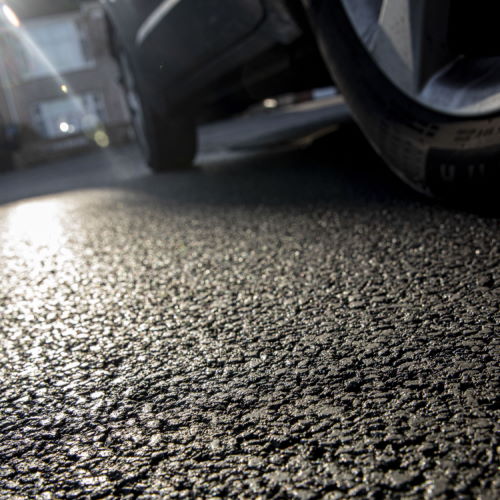RUBBER MODIFIED ASPHALT
Warm mix asphalt with recycled rubber for road resurfacing
Elm Tree Avenue, Coventry

Client
Coventry City Council
Contractor
Premier Asphalt
Location type
Residential Road
Completion
February 2021
The challenge
This residential avenue in Tile Hill, to the west of Coventry required resurfacing. The road was in daily use by local residents with frequent vehicle movements and onstreet parking and the existing surface was heavily patched. The client, Coventry City Council were keen to make sure work was completed with minimum road closures and disruption to residents. In line with the City Council’s commitment to reducing carbon emissions, their highways team also wanted to explore more sustainable ways of working. After discussions with Tarmac’s Technical Product Support Manager they chose a Rubber Modified Asphalt which incorporates recycled rubber from old tyres and a more sustainable warm mix binder. Coventry was one of the first cities to produce a climate change strategy, setting a target in 2012 to reduce carbon dioxide emissions by 27.5% by the year 2020 which it achieved six years early in 2014. Coventry City Council has also been one of the pioneers in the development of this innovative asphalt, successfully trialling it as a 10mm SMA in mid 2018.
Our solution
Rubber Modified Asphalts incorporate ground rubber end of use car tyres. This enables rubber from around 500 tyres to be recycled per kilometre of road, helping to reduce the 120,000 tonnes of rubber waste exported from the UK annually. Rubber Modified Asphalt SMA is a direct alternative to 50 pen SMA and delivers the same performance and surface characteristics in terms of regularity and texture. Rubber Modified Asphalts use proven Ultilow warm mix asphalt technology and are manufactured and laid at lower temperatures. This results in a typical 8-10% reduction in carbon emissions. Air quality is also improved for paving teams and residents, with up to 90% reduction in fumes on site and a lower risk of burns. Warm mix asphalts also offer proven gains in productivity, needing less time to reach trafficking temperatures. This allows more work to be completed within a given operating window for fast, efficient resurfacing and less disruption to traffic.
Results and benefits
Around 195 tonnes of Rubber Modified asphalt was supplied by Tarmac as an SMA 6 Surf PSV 65 and laid by Premier Asphalt the surfacing contractor. The result was a smooth, even finish that was much quieter for residents living on the avenue. Using Rubber Modified Asphalt saved approximately 660kg of carbon dioxide emissions compared to an equivalent hot mix asphalt and helped save over 190 end of life tyres from landfill. The scheme was also reopened to traffic nearly three hours earlier than what would have been expected from a hot mix asphalt, minimising disruption to residents and road users. After taking part in the original trials of Rubber Modified Asphalt the client was confident that the material would be as durable if not more durable than a conventional hot mix asphalt. “We are always keen at Coventry to look at ways of meeting our sustainability targets within the city. So, when we got the chance to use the rubber modified asphalt, we jumped at it. We are confident of the durability of the material, which is proving to stand up equivalent, if not better than other materials used around the city” Neil Cowper, Head of Highways, Coventry City Council.
Additional info
Sustainable solutions
Rubber Modified Asphalt is just one of the many sustainable solutions from Tarmac. The development of Rubber Modified Asphalt is part of our commitment to the circular economy, with the business recycling 8.7 million tonnes of waste from other industries every year.
Lower carbon emissions
The typical carbon footprint of Tarmac’s rubber modified SMA solution will be around 8% lower than the equivalent conventional SMA.
Recycling
Tarmac Rubber Modified Asphalt incorporates up to 500 waste tyres for every kilometre of highway surfaced.
